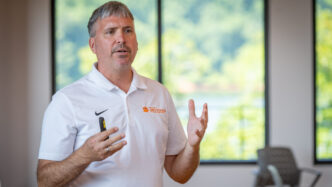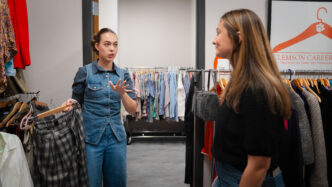“AI won’t replace humans, but humans who use AI will replace humans who don’t,” says Fei-Fei Li, the “Godmother” of modern artificial intelligence. This quote might have been read as a threat by some, but for Assistant Director of Career Development Maggie Erickson, it was an inspiration, fueling the creation of Clemson University’s pioneering Career Innovation Lab — a prototype program that gives students a space to explore generative AI’s role in the workplace and prepare for its impact on their future.
In Spring 2023, Erickson recognized generative AI was going to change the world of work. No one could quite predict how, but she identified a need for action and worked closely with colleagues in the Center for Career and Professional Development (CCPD) to establish a space, intentionally separate from the academic sphere, for students to familiarize themselves with generative AI.
“We needed a sandbox where people could play around with generative AI and not worry about grade consequences or plagiarism issues,” says Erickson.
Thus, the Career Innovation Lab was born. In partnership with Student Affairs, Erickson secured space for a pilot of the program in Tiger Den on the first floor of the Hendrix Student Center. The program launched on March 15, 2025, and its inaugural semester saw over 200 unique students through six sessions — an encouraging start for such a groundbreaking project. Presently, these meetings occur weekly on Wednesdays from 1:30-6:30 p.m on the third floor of Cooper Library in room 309 — the Learning Commons.
Though it differs from traditional career services at Clemson in many ways, the Career Innovation Lab retains one foundational element — it is extremely people-focused. As a part of Erickson’s mission to help students feel comfortable in the space, she employs a large group of UPIC interns to be the faces of the lab. These interns complete formal prompt engineering and consulting training in order to deliver effective and approachable peer-to-peer services. They facilitate conversations with students about how they use AI and where the students’ doubts lie, then walk them through a problem-solving methodology called “Life Design” that provides a framework for making decisions when there is uncertainty ahead. Through this process, the interns offer informed insight to help students feel more comfortable with generative AI and the opportunities it supplies.

Among the many skills that students develop in the lab, digital literacy is one of the most critical. The interns make it a priority to broaden their peers’ horizons beyond standard AI programs like ChatGPT, aiming to equip students with a comprehensive AI toolbox for future reference.
“It’s just a matter of understanding what technology to use and how to use it appropriately — that is going to be huge for incoming generations,” says intern Daniel Visser ’24, a graduate student studying computer science.
Beyond the impactful aid they give to their fellow students, Career Innovation Lab interns are also gaining valuable professional experience. They have developed several Generative Pre-trained Transformers (GPTs) to meet specific student needs — a Tiger Talk GPT, for example, that is trained on all Clemson career resources, as well as a more targeted Career Fair GPT to answer questions related to the recent fall event. Junior intern Emma Decker describes how she used the latter — created by coworker Visser — to inform her Career Fair experience.
“I told the GPT: I am going all three days this week as an industrial engineering major, and I am looking for an internship this summer — tell me every company that is going to be there, when they will be set up, if they’re looking for me, and what a good initial question to ask is. And the AI gave me a document with all of that information and more. It helped me know my exact goals moving forward, which gave me so much confidence.”
Erickson hopes the lab will be a resource for all demographics at Clemson University. The program is marketed to all ages — especially first- and second-year students, who can benefit greatly from early career preparation and engagement with generative AI. Additionally, the lab has succeeded in reaching every college, scheduling pop-up labs and meetings to expose a wide range of majors to the unique resource. Senior intern Ava Snee, an economics major with a minor in management, has done incredible outreach work, speaking in front of up to nine classes a week and serving on panels at major conferences, including the South Carolina Association of Colleges and Employers. An intern with the Career Innovation Lab since its inception last fall, she has found the experience to be “eye-opening,” and she hopes to lead others to this enlightenment.

The Career Innovation Lab operates with the goal of delivering the No. 1 student experience, as outlined in the Clemson Elevate strategic plan. By establishing a space for students to develop the critical competency that is generative AI literacy, Erickson hopes to turn a disruptive force into a tool that helps students build confidence in their career readiness and successfully adapt to a dynamic workforce.
“When students come here, they’re here to get domain knowledge — to understand what they need to know to go into the world of work. But they’re also here to mature and develop their skills as human beings,” Erickson says. “It will be difficult to be a productive, thoughtful, critical-thinking citizen in a world dominated by generative AI if you have had no exposure to it.”
Looking ahead, Erickson foresees the Career Innovation Lab’s importance and relevance holding strong. The team hopes to host a symposium in the future, partnering with colleges statewide to reach a broader student population. As generative AI continues to advance, so, too, will the lab — it is a timeless resource.
“I believe the Career Innovation Lab will continue to be a significant program because we’re about innovating in whatever comes next,” says Erickson. “What I hope is that we become a hub where students continue to interact, understand and learn.”
What began as a humble prototype has grown into a transformative experience that honors the central purpose of Clemson, which is to prepare students for their life beyond the University.








